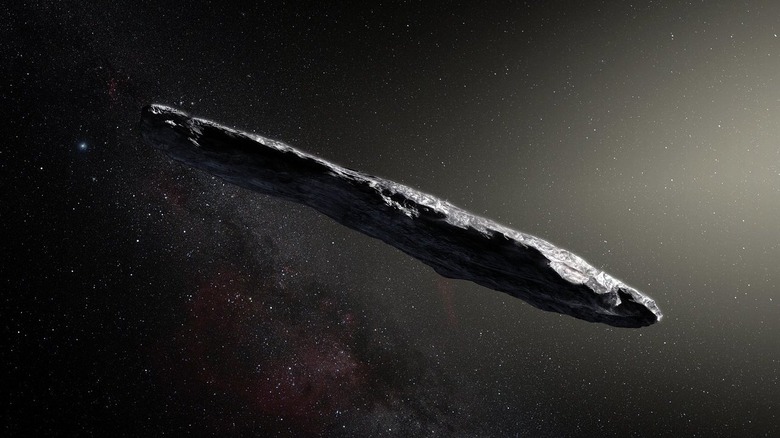There's A New Theory About The Strange Asteroid Oumuamua, And Aliens Aren't Involved
One of the strangest astronomy stories of the past few years is the sudden appearance of what scientists believe is the first interstellar object ever to be detected in our solar system. The cigar-shaped space rock known as Oumuamua puzzled scientists who attempted to explain what it was and where it may have originated, and there are still more questions than answers.
At first, researchers couldn't decide whether or not it was an asteroid or a comet, and then debate raged over why Oumuamua appeared to actually speed up after it swung around the Sun and headed back into space. That last point is still the subject of ongoing research, and a new theory to explain its acceleration is set to appear in Astrophysical Journal Letters.
Some fringe astronomers have proposed that the object was actually some kind of extraterrestrial ship, or perhaps just part of one, and that its odd behavior can be explained by the fact that it is equipped with some kind of propulsion technology. This new paper doesn't venture into that highly theoretical territory, but instead seeks to explain Oumuamua's strange acceleration by painting out own Sun as the culprit.
In the paper, graduate students from Yale and Caltech propose that Oumuamua sped up due to the effects of the sun's rays on its exposed side. The object was observed tumbling through space, and the researchers think it's possible that the light on its Sun-facing side may have been enough to cause a jet of water vapor to develop on its surface. As the object tumbled, the sides facing our star may have continued to spew water vapor whenever the sunlight struck it, continuing to push it to higher and higher speeds.
At this point it's impossible to say whether this or any other theory about the bizarre asteroid holds water. It appeared out of nowhere and left just as quickly, giving scientists very little time to look for clues that could explain its behavior. Still, it's an interesting theory that would explain Oumuamua's change in speed, and seemed at least a bit more plausible than aliens.
